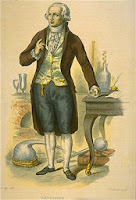 |
| Lavoisier |
An example will illustrate the difference between these two concepts:
- Antoine-Laurent de Lavoisier is
considered the father of modern chemistry. His Traité Élémentaire de Chimie
revolutionized many of the ideas that until then had dominated this
science. However, when it comes to the chemical reactions it describes, this
book is a mere catalogue. So we are told something like this:
If we mix oxygen gas and hydrogen gas and apply fire or an
electric spark to the mixture, an explosion occurs and the result is water.
This is a description. It tells what happens but offers no explanation of the phenomenon.
 |
| John Dalton |
- With his atomic theory, John Dalton offered an explanation for Lavoisier's description. This one:
2H2+O2→2H2O
In
other words: hydrogen gas consists of molecules made up of two hydrogen atoms
bonded together. The same goes for oxygen gas. When reacting, because of the
application of fire or an electrical spark, two molecules of hydrogen and one
of oxygen combine, giving rise to two molecules of water, each one of which is
formed by two atoms of hydrogen and one of oxygen.
In science, explanations are much more
important than descriptions. In another
post in this blog, I pointed out that science will never be able to explain
everything, because there will always be a level that we can only describe, but
not explain, and if we ever manage to explain it, it will be at the cost of introducing
a new level that we can only describe, but not explain.
In fact, we currently have not just two degrees of scientific knowledge, but four:
- Explanations, such as the atomic theory with
regards to chemical reactions.
- Descriptions, such as the theory of
fundamental particles (quarks and leptons), for which we currently have no
explanation, although these descriptions help to explain a different level: the hadrons.
- Hypotheses, such as the supposed
existence of dark matter which, although not experimentally proven, helps
to give provisional explanations to measurable observations, such as the
rotation of galaxies.
- Hypothetical lucubrations, which are offered
without any justification based on experimentation or observation. This
type of speculation is proliferating a lot lately. I will cite, as
examples, the existence of extraterrestrial intelligence, the possibility
of building strong artificial intelligence, or the various theories of the
multiverse.
 |
| Richard Dawkins |
In a previous post I pointed out that Richard Dawkins, in his debate with John
Lennox, said that neither he, nor Lennox, nor
anyone else knows anything about scientific issues such as the origin of the
universe or the origin of life. Here Dawkins hit the mark, for when
scientists say that the universe arose as a
spontaneous fluctuation of the vacuum (or a fluctuation of nothing, as some of them say,
displaying their ignorance), they are not offering an explanation of the origin
of the universe, or a
description of what could have happened, not even a hypothesis based on
observation, but just a
hypothetical lucubration, without any experimental or
observational basis, so the scientific value of this statement is equal to
zero. It is just an exercise of imagination without scientific basis and
without explanatory power. Many scientists cannot distinguish between science
and science fiction.
Thematic Thread about Science in General: Previous Next
Manuel Alfonseca
No comments:
Post a Comment